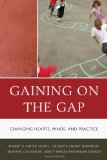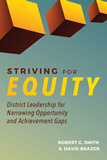Smith, Robert

Dr. Robert G. Smith
PhD, University of Maryland
Associate Professor Emeritus of Education
Representative, Division of Education Leadership and Policy
Phone: (703) 993-5079
Fax: (703) 993-3643
Email: rsmithx (@gmu.edu)
George Mason University
Fairfax Campus
Thompson Hall 1306
4400 University Dr.
MS 4C2
Fairfax, VA 22030
Prior to joining Masons Education Leadership Program faculty in 2009, Rob served 44 years as a K-12 public school educator, working as a teacher, building and central office administrator, and superintendent. He retired in July 2009, after serving 12 years as the Superintendent of the Arlington, VA Public Schools. Rob spent the preceding 16 years as the Assistant Superintendent for Curriculum and Instructional Services for the Spring Independent School District in the Houston, TX area. The first 16 years of his career occurred in the Frederick County, Maryland Public Schools where he performed a variety of roles including teaching high school social studies, heading an adult evening high school and a junior high school, supervising federal and adult education programs, serving as the superintendents assistant for planning and evaluation and directing K-12 curriculum and staff development.
Rob and his wife Sandy live in Arlington. They are the parents of two adult children and grandparents of five youngsters.
- Eliminating achievement gaps
- Superintendent decisions and achievement gaps
- Teaching for meaning
- Leading schools and school districts
- Professional learning communities
Books
-
Smith, R.G. & Brazer, S.D. (2016). Striving for equity: District leadership for narrowing opportunity and achievement gaps Cambridge, MA: Harvard Education Press.
-
Smith, R.G., Strand, P.J., Crawley, A., Cotman, T., Robinson, C. & Swaim, M. (2011). Gaining on the gap: Changing hearts, minds and practice. Lanham, MD: Rowman and Littlefield.
Book Chapters
-
Bauer, S., Van Lare, M., Brazer, S. & Smith, R.G. (2015). Teacher leadership in collaborative teams: The importance of process. In P. Tenuto (Ed.), Renewed accountability for access and excellence: Applying a model for democratic professional practice in education (pp. 131-146). Lanham, MD: Rowman and Littlefield.
-
Bauer, S., Brazer, S., Van Lare, M, & Smith, R.G. (2013). Organizational design in support of professional learning communities in one district. In S. Conley and B.Cooper (Eds.) Teacher collaboration: Advancing professionalism & school Quality (pp. 49-80). New York: Rowman and Littlefield.
-
Van Lare, M., Brazer, S., Bauer, S. & Smith, R.G. (2013). Professional learning communities using evidence: Examining teacher learning and organizational learning. In S. Conley and B. Cooper (Eds.) Teacher collaboration: Advancing professionalism & school quality (pp. 157-182). New York: Rowman and Littlefield
-
Knight, S. & Smith, R. (2004). Development and use of a classroom observation instrument to investigate teaching for meaning in diverse classrooms. In H. Waxman, R. Tharp and R.S. Hilberg (Eds.), Observational research in U.S. classrooms: New approaches for understanding cultural and linguistic diversity (pp. 97-121). Cambridge University Press.
-
Smith, R.G. & Knight, S. (1997). Collaborative inquiry: Teacher leadership in the practice of creative intelligence. In R. Sinclair & W. Ghory, W. (Eds.), Reaching and teaching all students: Grassroots efforts that work (pp. 39-60). Thousand Oaks, CA. Corwin Press.
Articles
-
Smith, R.G. & Brazer, S.D. (2016). Superintendents' part in narrowing opportunity, achievement gaps. School Administrator, 73(5), 34-36.
-
Smith, R.G. (2015). Turning conventional wisdom on its head: Public schools outperform private schools. Harvard Education Letter, 31(1), Retrieve from: http://hepg.org/hel-home/issues/31_1/helarticle/turning-conventional-wisdom-on-its-head-public-sch
-
Smith, R.G. (2013). The promising practice of induction. Harvard Education Letter, 29(1), Retrieve from: http://www.hepg.org/hel/article/561#home.
-
Smith, R.G. (2012). Can brief interventions help reduce achievement gaps? Harvard Education Letter, 28(2). Retrieve from: http://hepg.org/hel/article/528.
-
Smith, R.G. (2012). Educating children of poverty: School action alone is not enough. Reading Today, 29(4), 31–32.
-
Smith, R.G. and Skeans, S. (2011) Using program evaluation to support academic excellence (The Informed Educator series) Alexandria, VA: Educational Research Service. Retrieved from: http://www.edreadysearch.org
-
Skeans, S. Smith, R. (2011) Seeing the whole: Seven decision points when you plan a program evaluation in your school district. The School Administrator, 68(11), 34-37.
-
Smith, R.G. (2010). Gaining on the gap. The School Administrator, 67(6), 21-24.
-
Knight, S., DeLeon, N. & Smith, R. (1999). Using multiple data sources to evaluate an alternative scheduling model. The High School Journal, 83(1), 1-13.
-
Smith, R.G. (1996). Fashioning effective solutions: The promise of school study teams. Equity and Excellence in Education, 29(1), 20-29.
-
Smith, R.G. (1994). Teacher study teams: A focused approach to school problem solving. ERS Spectrum, 12(3), 13-20.
Book Reviews
-
Smith, R.G. (2016, October 20). School board effectiveness: A balanced governance approach. Review of the book Improving school board effectiveness: A balanced governance approach, by T.A. Alsbury and P. Gore. Teachers College Record, Retrieved from: http://www.tcrecord.org ID Number: 21687.
-
Smith, R.G. (2012, May 29). Book review: Smith on Narrowing the Achievement Gap. Education Week. Retrieved from:http://blogs.edweek.org/edweek/bookmarks/2012/05/book_review_smith_on_narrowing_the_achievement_gap.html
- Special Topics in Education (EDLE 597)
- Leading Schools and Communities (EDLE 610)
- Supervision and Evaluation of Instruction (EDLE 618)
- Organizational Theory and Leadership (EDLE 620)
- Contemporary Issues in Education Leadership (EDLE 634)
- Adult Motivation and Conflict Management in Education Settings: A Case Study Approach (EDLE 636)
- Using Research to Lead School Improvement (EDLE 690)
- Internship in Educational Leadership (EDLE 791)
- Contemporary Organization Theory (EDLE 801)
- Leadership and Decision Making (EDLE 802)
- Social and Political Forces in Education Leadership (EDLE 813)
- Instructional Leadership-Curriculum Policy and Practice (EDLE 816)
- Instructional Leadership-Supervision Policy and Practice (EDLE 818)
- Leadership Seminar (EDUC 802)
- Independent Study for the Doctor of Philosophy in Education (EDUC 897)
- Advanced Internship in Education (EDUC 994)
- Doctoral Dissertation Proposal (EDUC 998)
- Doctoral Dissertation Research (EDUC 999)


